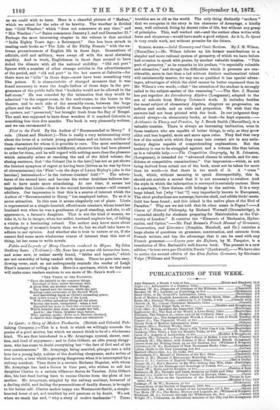in Quest; a Story of Modern Tendencies. (British and Colonial
Pub- lishing Company.)—This is a book to which we willingly concede the praise of a good motive, but which we cannot think to be of a wholesome kind. We are first introduced to a Mr. Annytage, cynical, clever, rest- less, and fond of enjoyment ; and to John Gilbert, an able young clergy- man, who has come to doubt everything but "the fact of God and of his own consciousness." Mr. Armytage, being married, plunges into a wild love for a young lady, a sister of the doubting clergyman, and a writer of fast novels, a love which is growing dangerous when it is interrupted by a railway accident. Then there is a certain Madame Magniae, with whom Mr. Armytage has had a liaison in time past, who wishes to sell her daughter Clarice to a certain villanous Baron de Vanrien. John Gilbert dies, his last deed having been to rescue Clarice from the plots of her mother. Mr. Armytage, crippled by the railway accident, bereaved of a darling child, and feeling the premonitions of deadly disease, is brought to his better self. Clarice makes happy one Westmacott Smith, a simple- hearted lover of art, not troubled by evil passions or by doubt. We ask when we reach the end, "why a story of modern tendencies"? These
troubles are as old as the world. The only thing distinctly "modern" that we recognise in the story is the character of Armytage, a kindly man, well cultured, living by decent rules of life, but without any grasp of principles. This, well worked out—and the author often writes with force and eloquence—would have made a good subject. As it is, In Quest is very crude work, not withoat promise for the future.


































 Previous page
Previous page